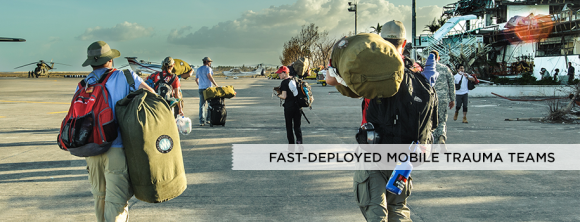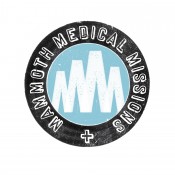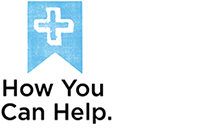Fast-deployed Surgical Trauma Teams
 Rapid-deployed Austere Medical (RAM) teams could be a relatively simple means of significantly improving the international community’s response to mass casualty events such as hurricanes, earthquakes, or terrorist attacks. Placing well-trained, well-supplied surgical teams in disaster zones within the first 72 to 100 hours would save lives and limbs directly while serving the larger, longer-term effort by establishing better lines of communication and supply between air bases where international relief is arriving and the people most in need.
Rapid-deployed Austere Medical (RAM) teams could be a relatively simple means of significantly improving the international community’s response to mass casualty events such as hurricanes, earthquakes, or terrorist attacks. Placing well-trained, well-supplied surgical teams in disaster zones within the first 72 to 100 hours would save lives and limbs directly while serving the larger, longer-term effort by establishing better lines of communication and supply between air bases where international relief is arriving and the people most in need.
Here are five things we are focused on at MMM:
1) Training: Doctors, medical staff, and other first responders need to undergo intensive mass-casualty and disaster scenario training so they’re ready to set up effective field triage units quickly, and can function effectively in austere environments.
2) Readiness: Precious hours can be wasted staffing- and gearing-up. Teams need active rosters of on-call volunteers with current medical licenses, passport copies, vaccination records, etc., on file. Medical packs, food, water purification, and self-sufficient field and camping equipment should be organized and go-ready at all times.
3) Bat Signal: In order to stay on top of where they might need to go—before it makes the news—teams need to commit to rotating shifts of one member regularly checking a variety of international weather/disaster monitoring systems such as the National Weather Service, the Joint Typhoon Warning Center (JTWC), and the National Earthquake Information Center (NEIC). A unique ring tone or other special alert could notify other members that they’re being deployed.
4) Communications: An isolated team is not as effective as one that’s tied in and in touch with the larger relief effort. All teams should have a dialed-in, off-grid satellite and line-of-sight communications system with solar charging capacity, and a team member dedicated to using it.
5) Contacts Bible: Internet and cell phone service are likely to be as hard to come by in a disaster zone as a hot shower and a cold beer. Equipped with a functioning sat-phone and a pack of Sharpies, the most effective team will have at least one copy of a good old-fashioned, printed-on-paper address book full of relevant contacts like the World Health Organization (WHO), the International Red Cross, the various branches of the U.S. Military, foreign governments and embassies, airlines and shipping companies, other NGOs, and local logistics coordinators—on every continent. And it will be waterproof.






